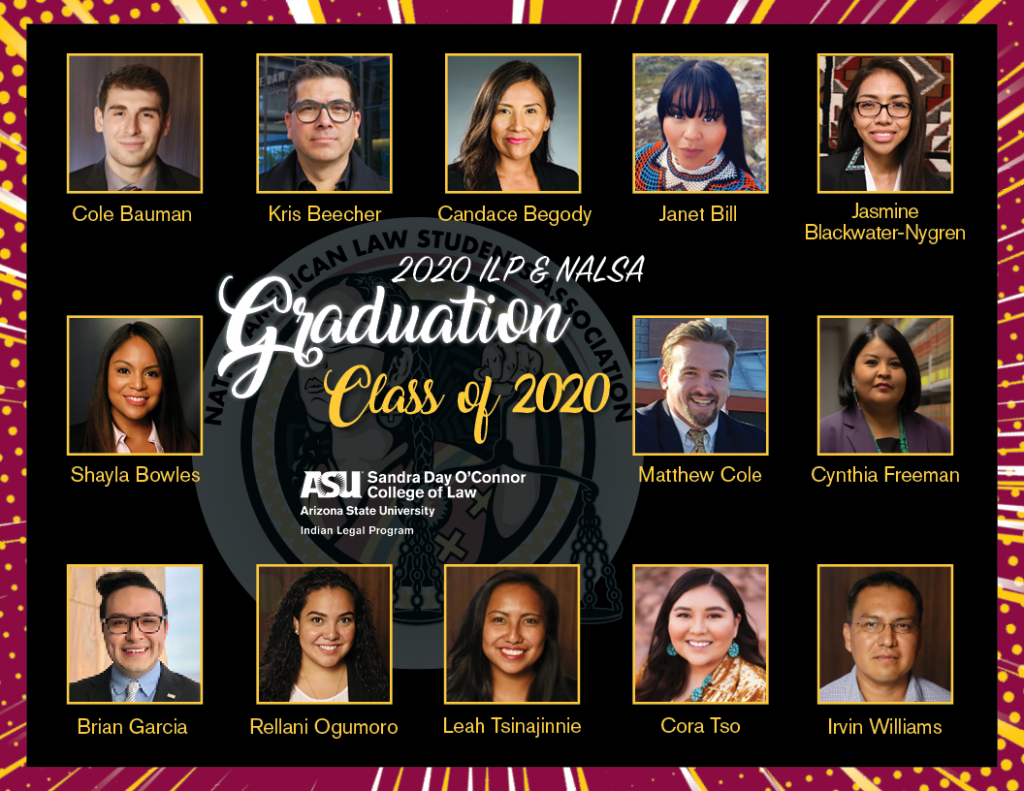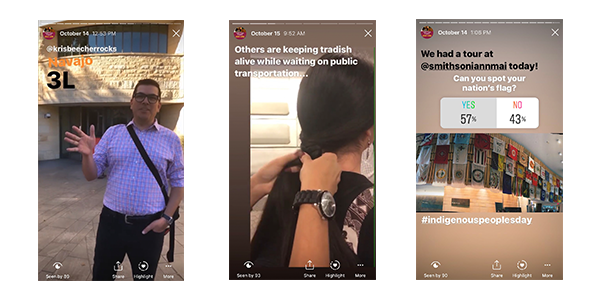Category Archives: ASU Native Alumni Chapter
Indigenous People’s Day 2019 – Students’ Thoughts
Job Opportunity: Posting for Maricopa County Superior Court Vacancy
Applications Being Accepted for a Vacancy on the Maricopa County Superior Court
Applications are being accepted for a vacancy on the Superior Court in Maricopa County created by the appointment of Judge Susan M. Brnovich to the U.S. District Court, District of Arizona.
The Maricopa County Commission on Trial Court Appointments will review applications, interview selected applicants, and recommend at least three nominees for the vacancy to Governor Doug Ducey, who will appoint the new judge.
The most current judicial application form (revised January 2017) can be downloaded at the Judicial Department website: www.azcourts.gov/jnc. Applications may also be obtained from the Administrative Office of the Courts, Human Resources Department, 1501 W. Washington, Suite 221, Phoenix, by calling (602) 452-3311, or by sending an electronic mail request to jnc@courts.az.gov.
Applicants must be at least 30 years of age, of good moral character, admitted to the practice of law in, and a resident of Arizona for the past five years, and a resident of Maricopa County for the past year.
A signed original application with all attachments, and a searchable .pdf version of the application and attachments must be submitted to the Administrative Office of the Courts, Human Resources Department, 1501 W. Washington, Suite 221, Phoenix, AZ, 85007, by 3:00 p.m. on November 19, 2018.
Applicants for the recent vacancies in Maricopa County DO NOT need to reapply to be considered for the new vacancy.
The Commission may, at its discretion, use the applications filed for this vacancy to nominate candidates for any additional vacancies known to the Commission before the screening meeting for this vacancy is held.
All meetings of the Maricopa County Commission on Trial Court Appointments are open to the public. Meeting dates will be announced.
The new judge will be paid $149,382.60 annually.
National Native American Bar Association Releases Study of Native American Attorneys
The National Native American Bar Association (NNABA) and NNABA Foundation recently released the results of the first-of-its-kind research study on Native American attorneys. This research is the only comprehensive research regarding Native American attorneys across all practice settings where each and every of the over 500 survey respondents identified as Native American.
One of the powerful findings of this study is that Native Americans often feel invisible and share an overarching perspective that their experiences are not valid or real. In addition to documenting the failure of traditional diversity and inclusion efforts to reach Native American attorneys, the study sheds light on unique challenges facing American Indians. Native Americans are clearly behind even other underrepresented groups in terms of inclusion, retention, and representation.
“This comprehensive research is not only the first – but the only – research that examines the experiences of Native American attorneys across all practice settings. It presents a stark portrait of an entire group of attorneys systematically excluded from the legal profession,” said Mary Smith, NNABA President. “It is clear that traditional diversity and inclusion programs are simply not working for Native American attorneys. NNABA hopes that this research will be used to build a more robust pipeline of Native American attorneys and to work toward the full inclusion of Native Americans in the legal profession.”
Highlights of the research include:
- The survey captured information from 527 Native American attorneys, approximately 20% of the 2,640 Native American attorneys in the United States.
- The most satisfied attorneys were working in the tribal sector, and the least satisfied attorneys were working for the federal/state government or law firms; however, tribal politics/cliques, overwhelming workloads, and not being able to make an impactful difference were cited as primary sources of dissatisfaction even in the context of being generally satisfied.
- Over 40% of the attorneys overall in the study reported experiencing demeaning comments or other types of harassment based on their race, ethnicity, and/or tribal affiliation; and 33.63% reported experiencing one or more forms of discrimination based on their race, ethnicity, and/or tribal affiliation.
- Women were more likely than men to report demeaning comments and/or harassment based on gender (38% to 3%); discrimination based on gender (35% to 4%); denial of advancement or promotional opportunities due to gender (21% to 3%); and denial of appropriate compensation due to gender (29% to 1%).
- Over 76% of the attorneys in this study reported that more awareness and understanding of issues faced by Native Americans would have a positive impact on their careers. In comparison, only 60% of the attorneys felt that more effective implementation of diversity and inclusion policies in their workplace would have a positive impact on their careers. This is not surprising given the ways diversity and inclusion initiatives have largely ignored the issues and concerns of Native American attorneys.
For more information and to view the full report and the executive summary, go to http://www.nativeamericanbar.org/native-american-attorney-study/.
Founded in 1973, NNABA serves as the national association for American Indian, Alaska Native, and Native Hawaiian attorneys, judges, law professors and law students. NNABA strives for justice and effective legal representation for all American indigenous peoples; fosters the development of Native American lawyers and judges; and addresses social, cultural and legal issues affecting American Indians, Alaska Natives, and Native Hawaiians.
For more information contact 480-727-0420 or visit www.nativeamericanbar.org.
Elizabeth Medicine Crow – Audio Recording
In case you missed the lunch lecture given by Elizabeth Medicine Crow yesterday, you can listen to the audio recording click here.
Feb 26-27 – Opportunities and Challenges in Providing Health Care in Indian Country CLE Conference
Walk-In Registration: Non-CLE Rate $100.00 / CLE Rate $250.00. Walk-In Registration tomorrow at 7:30 a.m. Please join us. Visit the website for agenda, directions, parking and more.
Judicial Development Project – Justice at Stake
Judicial Development Project – Justice at Stake
A new project regarding development of the judiciary. The program is a year long, that fosters relationships between persons who are considering a role on the bench and either sitting/retired judges.
Navajo Nation Law 2014 CLE Conference – Oct 24, 2014 – Early Bird Registration ends tomorrow 10/01 at 5 pm.
Navajo Nation Law 2014 CLE Conference – Oct 24, 2014 – Early Bird Registration ends tomorrow 10/01 at 5 pm. Get your required annual Navajo Bar CLE credits here. New Mexico MCLE approval pending.
Click here for Agenda and Registration:
Professor Robert N. Clinton receives the Lifetime Achievement Award by the Native American Bar Association of Arizona
 Congratulations to ILP’s Professor Robert N. Clinton who received the Lifetime Achievement Award by the Native American Bar Association of Arizona last Saturday at the 6th Annual NABA-AZ – The Seven Generations Annual Awards Dinner & Silent Auction.
Congratulations to ILP’s Professor Robert N. Clinton who received the Lifetime Achievement Award by the Native American Bar Association of Arizona last Saturday at the 6th Annual NABA-AZ – The Seven Generations Annual Awards Dinner & Silent Auction.
Quote from Carole E. Goldberg, UCLA Law, Jonathan D. Varat Distinguished Professor of Law, Vice Chancellor, Academic Personnel. B.A. Smith College, 1968, J.D. Stanford, 1971
In the spirited exchanges over treatment of cases and doctrines, Bob was not shy about expressing his views, and more than held his own with more senior colleagues. His razor sharp analytical powers were on display from the start. It became my lifetime goal to stay on the right side of that blade. Over the next twenty years, I had occasion to learn from Bob’s many law review articles, including his classic explication of Indian country criminal jurisdiction – to this day called a “maze,” a term Bob coined – and his original designation of federal Indian policy as “colonialism.”
Some of the arguments about treatment of particular cases and doctrines, especially arguments between Bob and me, could get intense. Rebecca became very adept at ducking. But it was all done with respect and affection, and out of concern to make the casebook the best possible instrument for teaching federal Indian law. We even included a tribal court opinion that Bob had written, and proceeded to critique it in the Notes.
Congrats also goes out to the following ILP Alums:
Community Service Award: Diane Enos, President, Salt River Pima-Maricopa Indian Community (Class of 1992)
NABA-AZ Member of the Year: Diandra D. Benally, Assistant General Counsel, Fort McDowell Yavapai Nation (Class of 2005)
Kevin Gover – Moving beyond the “imaginary Indians” perception
 Please see the Washington Post article about Kevin Gover – Moving beyond the “imaginary Indians” perception.
Please see the Washington Post article about Kevin Gover – Moving beyond the “imaginary Indians” perception.
Kevin Gover – Moving beyond the “imaginary Indians” perception at http://www.washingtonpost.com/opinions/fred-hiatt-moving-beyond-the-imaginary-indians-perception/2014/09/21/ea1ee614-3f3b-11e4-9587-5dafd96295f0_story.html





